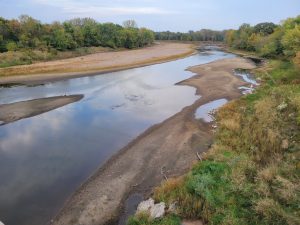(Radio Iowa) – River and stream flows have dropped as the wet spring turned to a dry fall, which raises some concerns for fish. D-N-R fisheries biologist Scott Grummer works in north-central Iowa. “We’re starting to get a few calls from citizen reports of some fish getting stranded in isolated pools, especially at the you know, the upper, upper reaches, or headwaters of some of our rivers,” he says. Grummer says the wet spring had rivers full, but it never fully replenished groundwater.
“Even with the flooding, you know, the sub soil moisture wasn’t fully replenished, and once we got those spring rains through, you know, we slid right back into dry events where we seen very little rainfall really since July on, especially parts of Iowa, and kind of slid us right back to where we were a year ago, at this time in drought,” Grummer says. Rivers with less water depth could freeze over. “The thing that keeps river water from from freezing solid is obviously the current, or flow velocity,” Grummer says. “And when we’re in these dry periods, like we are now, you know, the current is is minimal, and that makes it you know, where a harsh, cold winter could have some some dramatic effects on fish.”

Public Health Watch photo
He says the natural instincts of fish kick in. “Fish will move to the deepest water they can find to winter. They can sense winter coming. But when we’re in this, this type of drought and flow conditions, there’s not a lot of deep water for them to find,” he says. Grummer says there could be some fish kills. “On the positive side, you know, obviously, fish have dealt with droughts through history, and they are very resilient. And typically, it’s not like a complete destruction of the fishery, but it could cause some, some minor setbacks in in some areas, if, if we get a harsh winter, and especially in these northern Iowa rivers,” Grummer says.
Grummer says precipitation generally drops in the winter, so there’s not a lot of chance for the waterways to get replenished.










